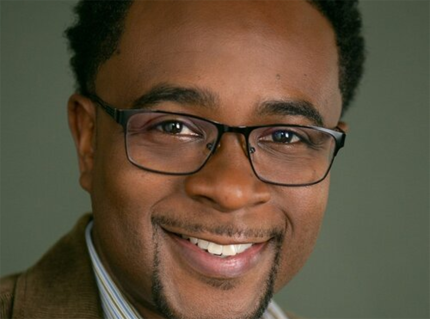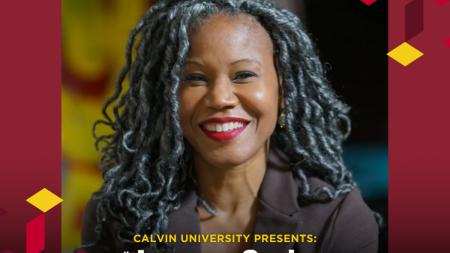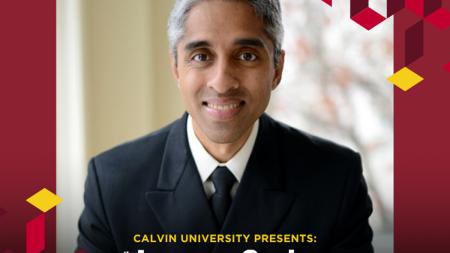Carrying on King’s Legacy

The time has come for churches — those that haven’t already done so — to stand up and join in the tough cause of rooting out racism, bestselling author Jemar Tisby said at the Stob Colloquium on Martin Luther King, Jr. Day, Jan. 18.
No longer, he said, can people simply sit in the pews and avoid hard conversations about race. No longer can people ignore the vestiges of racism that continue to tangle their hearts and eat at their consciences. No longer can people pretend that slavery happened long ago and that today we are free from what it did over centuries to thousands of people.
“Now is the time to declare where our congregations are at,” said Tisby, author of The Color of Compromise: The Truth about the American Church's Complicity in Racism. “Justice always takes sides. There is no way around it; you need to go through it.”
Tisby is president of The Witness: A Black Christian Collective, for which he writes a blog about race, religion, and culture. He is also the pastor of a small church.
“As we talk about racial justice, we need to talk about economic justice too,” he said. “The church can take action now” to bring attention to the need for a more equitable economic system that includes everyone. Unfortunately too many churches want to remain in a comfortable spot, preferring not to take action and ignoring the sins of the past.
Although not an overtly faith-based organization, Tisby points to the Black Lives Matter movement as an example of a group trying to make a difference. He especially saw this as demonstrations took place in cities across the U.S. last year to protest police brutality.
When Tisby watched blacks and whites join to confront police in the demonstrations, he saw hope that could lead, however difficult it might be, to change — a continued push for equality among all people.
“I think we are in a new era of civil rights,” said Tisby, who worked for several years as a school teacher in the Mississippi Delta. “There was a rude awakening that we saw during last summer’s uprisings.”
Before appearing at the annual Stob Colloquium, which was held at Calvin Theological Seminary, Tisby gave the Stob Lecture at the January Series, where he said Christianity is not about violence. But it is about pushing forward to a new day by holding on to your faith, which by itself is nonviolent and endures through patience, because it follows the teachings of Christ, he said.
The annual Stob Lecture and Colloquium are named after Dr. Henry Stob, who taught at both Calvin University and Calvin Theological Seminary. These events take place to honor the memory of the slain civil-rights leader Martin Luther King, Jr.
“When God wanted to reconcile people, he didn’t send us a message to view on TikTok. He sent his Son, Jesus,” said Tisby.
When God sent Jesus, Tisby added, God tore down the dividing line between God and heaven. Seeing that this took place, said Tisby, “God can surely do that for us — tear down the barriers that separate us.”
But in the meantime, he said, we have work to do.
Considering the insurrection that took place last week at the nation’s Capitol, where people came to violently protest the U.S. presidential election, Tisby said he can’t equate what they were doing with what Black Lives Matter protesters had in mind as they marched last summer.
Those marches, when you examine them deeply, were not just about police brutality. They also arose from a long history of lynchings, unequal education, lack of decent work, laws that made it hard to buy decent housing, and the reality that a higher percentage of black children die after childbirth than do white children.
“I think we are facing a time of great radical change,” said Tisby. “The question is not to fight racism, but ‘How are we going to fight it?’”
In fighting, he said, it will be necessary for some people to face the truth that the U.S. has an often-hidden history of racial inequality and oppression that remain a stain on the soul of the nation.
“Slavery was America’s system that turned the lives of persons into property,” he said.
“Slavery was about using blacks to work and not to pay them. It was about money and greed. It was about maximizing profit and minimizing loss. Black labor built the wealth of this nation through their work, and they have never been compensated a thing for it.”
Slavery was about dehumanizing blacks who were brought here in slave ships in which they were cramped shoulder to shoulder, sometimes in chains, in narrow bunks below the decks. If anyone acted up, they were whipped or worse.
Slavery was also about separating families when they arrived in the U.S. “Mothers were torn away from their daughters, and sons from their fathers,” said Tisby.
And even though slavery was outlawed after the Civil War, important aspects of it have endured. There were the Jim Crow laws that made sure whites and blacks didn’t mix, especially in the South.
Through it all has festered for some people the belief that being white means you have the power; you are right and have chances to better yourself from whatever situation you find yourself in.
“So many factors from wealth to health fall against racial lines,” he said. “But we can change that by taking intentional steps to befriend those who think differently than we do. We also need to fight racism on a policy level too.”
Because he was speaking on Martin Luther King, Jr. Day, Tisby talked about the legacy King left for those who follow after him in fighting for civil rights.
“He had a wonderful way of articulating the end goal, the dream, and about how hard it will be to get there,” said Tisby.
King “also drew on the history of the black church,” said Tisby. “It was the foundation of what he taught and fought for. He followed the lead of other beloved black pastors who had an investment in changing lives in the here and now and not just the by-and-by.”
The 2021 January Series, which is entirely online this year, is available live on weekdays from 12:30 p.m. to 1:30 p.m. through Tues., Jan. 26. Each day’s talk is also available for viewing till midnight that same day.


